Obviously, journalists are stressed out by nonstop COVID-19 coverage.
Journalists tell they spend all day talking with experts who are warning that the worst is yet to come and with people who are worrying about how to keep themselves and their families healthy. They report cancellation after cancellation while watching their retirement savings dwindle in the Wall Street storm.
My wife licensed psychotherapist Sidney Tompkins, and I have been doing a lot of training for newsrooms and media organizations about traumatic stress and trauma. I asked Sidney what she would tell you this morning.
We produced a video for you to share with your newsroom or to link to on journalism-related social media sites. I also produced a text version, below.
You are nicer to your coffeemaker than you are to yourself. At least you turn the coffeemaker off when you are not using it. This virus story is following you all the time, in your work life and your personal life. You have to consciously unplug from news coverage for a scheduled part of the day.
You probably are not sleeping enough. The last thing you do before you go to sleep is to check your phone. You might also check it in the middle of the night and you probably check it as soon as you wake up. Do not allow coverage of the virus to be the last thing you think about before you go to sleep. Ramp down your day. Slow down.
You are looking at disturbing information all day. The repetition underlies traumatic stress. All-day long you read about people who are sick, dying and worried. You see disturbing data and forecasts. If this occurred just once, you might be able to dismiss it as something that happened and has ended. But the repetitive nature of this kind of ongoing coverage will take a toll.
Reset. Keep things near you that will remind you of what “normal” looks like. For me, it is a picture of my silly dog. For you, it may be a favorite vacation photo or a love note from your sweetheart. After you have spent time covering whatever unpleasant thing it is you have covered, reset your mind to remember that this situation is not normal. Soldiers and police officers do this. Ask them and you will find they often keep photos of loved ones in their hats and helmets. I know a photographer who keeps a picture of his kids on his press credential lanyard.
Remind yourself that the trauma journalists experience is outweighed by the good work that you do. Researchers have found this can combat our work-related stress. Missionaries and emergency room doctors see awful stuff all the time but if they believe that the good outweighs the discomfort, then they can rationalize why they subject themselves to this discomfort. If journalists believe they are doing vital work — and you are doing vital work — then you will recover from trauma faster than if you are just driven by ratings or page views.
Be worried when you are not affected by disturbing images, scenes or interviews. When you can hear stories of pain and not be moved by them, that is when I worry about you most. It means you have disconnected. Temporary disconnection is a survival mechanism to get the job done, but when you shut down, it is a danger sign that you have retreated from reality.
Be aware of your alcohol and food consumption. When I get stressed, I turn to dark chocolate as my meds. Know your tendencies. If they are destructive, you may decide to remove them. Confront your discomfort, don’t medicate it with alcohol or other substances.
Talk to your loved ones. I married a journalist 26 years ago. One of our daughters is a journalist. I tell them all the time that I am not a mind reader. If you covered something awful today, or if you are overwhelmed at work, you have to tell me so I can help you work through it, or at least understand what is up with you.
Don’t wait for your boss to ask you if you need time off. Especially while we are working remotely, the boss may have no clue how you are doing. Speak up. And maybe more importantly, now is a good time to look after your coworkers without including the boss. If you see a coworker has been doing days upon days of tough stories, give them a call and say, “Hey, that is some tough stuff you are covering, how are you?” Al and I have heard from journalists who say that kind of unsolicited peer support means the world to them.
Read the original article on poynter.org.
More about: coronavirus
















































